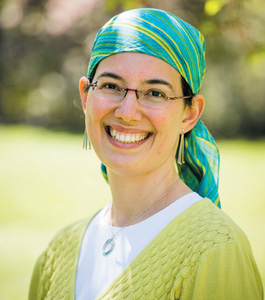
In Torah times there was Devorah, prophetess and judge. In Talmudic times there was Bruriah, “the wife of Rabbi Meir,” considered a sage and scholar in her own right. Today, the Israeli community of Efrat has a new manhiga ruchanit—spiritual advisor—in Jennie Rosenfeld. She is the first woman in the history of Israel to fill such a role.
“I am standing on the brink of something very exciting and there is a sense of hopefulness that this will lead to good for the Jewish community and help bring people closer,” Rosenfeld said in a phone interview from Jerusalem, where she lives with her husband and three children.
Rabbi Shlomo Riskin, the chief rabbi of Efrat, handpicked Rosenfeld for this new role. While her appointment was announced earlier this month, Rosenfeld will formally begin her position on Feb. 2 with an inaugural lecture.
Efrat’s decision to name a female spiritual leader has been met with controversy in Israel, whose government does not recognize women rabbis. Nevertheless, Riskin said he feels the move “will become a much wider phenomenon.”
“Women need role models,” Riskin told JNS.org. “There are questions women are not comfortable asking men, but comfortable asking women. … We are living in very special times in which religious education extends to women on a very high level—including Torah Shebichtav (written law) and Torah Sheba’al Peh (oral law). It is very important for women to be involved in discussions of Jewish law and to be seen as religious leaders in their own right.”
Rosenfeld, a native of Riverdale, N.Y., has a doctorate in English and is in her fourth year of a five-year heter hora’ah (permission to rule on Jewish law) ordination program at the Susi Bradfield Women’s Institute for Halachic Leadership at the Midreshet Lindenbaum seminary in Jerusalem. She is also enrolled in a separate 10-year track to become a female dayan, or religious judge. Only four others are enrolled in the same program.
Rosenfeld told JNS.org that she was connected to Jewish spirituality and learning from a young age, but that she could not have envisioned where that would take here. When she made aliyah six years ago with her husband, she enrolled in Midreshet Lindenbaum “to come back to learning, but I was open to kind of seeing where that process would go.” She did not apply for the new position in Efrat, but was handpicked by Riskin, who she called a “pioneer.”
It is unclear what Rosenfeld’s role will look like in one month or one year from now, she said, because “models of female halachic (Jewish legal) leadership don’t really exist in Israel.” Rosenfeld said the position is privately funded, but that she and Riskin envision that ultimately the Israeli government will create a state-sponsored post of a similar nature for women. For now, however, she is comfortable just being another address for the more than 9,000 residents of Efrat.
While distinct in some ways, Rosenfeld’s new appointment is couched in a growing trend in Israel of religious women pushing hard against their proverbial “glass ceiling.” For example, Israel’s first-ever haredi women’s party, B’Zhutan, made a bold debut last month in response to “feeling excluded” by the male-dominated haredi political parties.
Ruth Colian, 33, who is heading the party, told attendees at a January media conference in Tel Aviv, “We must give haredi women an address in our legislature. We have a lot to give and I believe we can do it.”
The feminist group Women of the Wall has made headlines for its push to have the Israeli government provide a place at the Western Wall where women can feel comfortable wearing tallit and tefillin as well as reading from the Torah. On the secular side, organizations such as WePower have sprouted up in the last decade, focusing on the advancement of women’s leadership in Israel both in government and the private sector.
“The way forward is complex,” WePower leader Ifat Zamir said in a past interview. “This is a social, public, and legal journey, and ultimately a personal one for every female manager attempting to break through the glass ceiling.”
Rabbi Dana Saroken, who has been serving as associate and then senior rabbi at the Conservative Beth El Congregation in Pikesville, Md., since 1998, told JNS.org that she finds that congregants seek counsel equally from her and from the synagogue’s male senior rabbi. She said that situation is not really “based on issues,” but that there “are times [congregants] want to come to me and times they want to go to him. … Having two rabbis with different personalities, beliefs, and genders is a really positive thing for the people.”
Saroken said that even in a place such as Baltimore—where 30 percent of the Jewish community considers itself Orthodox, according to the 2010 Greater Baltimore Jewish Community Study— there is an openness to female religious leaders. In the last decade, she said more local women have been studying Torah and becoming engaged in Jewish life.
“The challenge is the readiness of particular communities to say, ‘We recognize having women in this position can and usually does enhance the experience of the congregants and of the community,’” said Saroken.
In Efrat, it was the male spiritual leader who led by example on women’s empowerment.
“Rabbi Riskin took the first step on this issue,” Rosenfeld said. “Others will follow suit.”
Maayan Jaffe is senior writer/editor at Netsmart (ntst.com) and an Overland Park freelance writer. Reach her at [email protected] or follow her on Twitter, @MaayanJaffe.
By Maayan Jaffe/JNS.org













